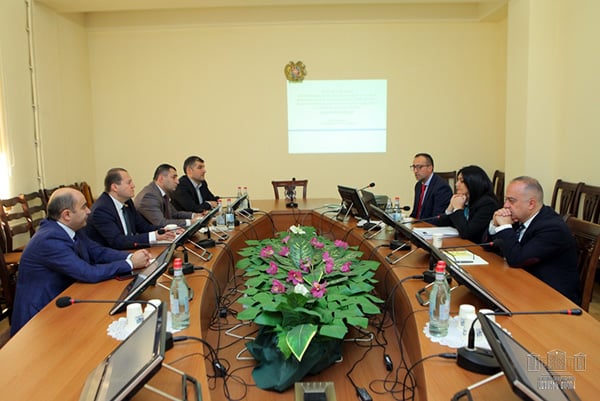Dear Members of the National Assembly,
We, the Public Health Working Group for Armenia and the Coalition for Tobacco Free Armenia, urge members of the National Assembly of the Republic of Armenia to vote to maintain the implementation schedule of all provisions of the legislation for tobacco control which were adopted by a large majority vote in February 2020.
At this crucial moment in Armenia’s history, it is even more important that the nation prioritize the health and well-being of the Armenian population over the business interests of the tobacco industry.
To improve the health of the nation, the National Assembly needs to continue adopting legislation that can have significant impact in a short amount of time and has a strong evidence-base that has worked in many countries around the world.
The legislation adopted by an overwhelming majority of the National Assembly of the Republic of Armenia in February, 2020, is a positive step in the right direction to improve the health of Armenia’s population by increasing the life expectancy and reducing premature deaths of hundreds of thousands of individuals. The recommendation of the Economic Affairs Commission to postpone implementation of this law is short-sighted and harmful.
The February 2020 legislation includes establishing 100% smoke-free public places, banning all forms of tobacco promotion and sponsorship, including a ban of tobacco display at the point of sales. Such policies have successfully reduced both tobacco use and tobacco-related premature deaths in multiple countries.
Read also
In particular, we call for the implementation of all provisions of the Law, as scheduled for 2021, highlighting:
The health warning on packaging, which increases public awareness of the harmful effects of tobacco products and its substitutes and is aimed at key populations, especially minors and teenagers.
The display ban at point of sale to reduce impulse purchases, provide a supportive environment for smokers to quit, and to reduce purchasing among minors and teenagers to prevent them from becoming smokers. Displays are used by tobacco companies to advertise their products particularly to attract minors and potential future users.
The complete ban of advertising promotion and sponsorship was established in 2010. The implementation of this provision is one of the most effective measures to prevent the manipulation of minors and teenagers and prevent them from becoming habitual tobacco users.
Smoking kills more Armenian men prematurely than any other preventable lifestyle determinant. Armenia has one of the highest prevalences of smoking in all of Europe. Nearly 51% of men over age 18 are regular smokers. According to an analysis from the WHO, of the 591,000 adult smokers in Armenia today, 295,500 are projected to die prematurely if there are no measures taken to reduce smoking on the national level. This number represents more than 10% of Armenia’s total population and is many times greater than the deaths Armenia has suffered from COVID-19 and the war combined this year.
The financial burden of tobacco use on Armenia’s economy is dire. There are significant health care costs for treating the diseases caused by tobacco use. Those who die prematurely deprive their families of income and hinder economic development from lost years of economic productivity. Armenia’s healthcare system is already stretched too thin treating COVID-19 and managing the treatment and rehabilitation of those injured by war. Reducing the burden of tobacco-related disease is essential for the health of the nation overall.
Nicotine is one of the most addictive substances in the world. The aim of tobacco companies is to develop new smokers and encourage an addiction to make them customers for life. Therefore, legislation that aims to reduce the start of smoking is considered most effective. In Armenia, every effort must be taken to protect our youth from this addictive behavior, and ensure the health of the next generation. Their health will also contribute to economic development.
We firmly believe that short-term economic ramifications of these laws will be trivial, if any. What is unique to Armenia is the opportunity to rise from the tragedies of 2020 with a renewed commitment to investing in a healthier population, which our country desperately needs to survive, rebuild, and thrive. There is no better time than now to remain firmly committed to the notion that an economically prosperous nation is built on the backs of a healthy and well-educated population.
Resist the efforts of the tobacco industry and their lobbyists. Save our next generation from the dangers of tobacco and nicotine addiction and also the exposure of secondhand smoke. Vote to protect the future of the nation.
Signed,
Public Health Working Group for Armenia (52 members worldwide)
Coalition for Tobacco Free Armenia (a union of 30 NGOs in Armenia)
Kim Hekimian, PhD, Columbia University Vagelos College of Physicians and Surgeons
Shant Shekherdimian, MD MPH, University of California Los Angeles
Lorky Libaridian, MD, Cambridge Health Alliance/Harvard University
Varduhi Petrosyan, PhD, American University of Armenia, Turpanjian School of Public Health
Tamar Kabakian-Khasholian, MPH, PhD, Faculty of Health Sciences, American University of Beirut
Arin A. Balalian MD MPH DrPH(c) Department of Epidemiology, Mailman School of Public Health, Columbia University
Alique Berberian, MPH, MIA, PhD student, UCLA Fielding School of Public Health
Valentina Ogaryan, PhD, University of California, Los Angeles
Vahe Khachadourian, MD, MPH, PhD, Icahn School of Medicine at Mount Sinai
Michael Abassian, B.S., MPH Candidate, University of California, Berkeley
Alexa Arejian, B.A., University of California, Berkeley
Lara Rostomian, B.A., MS Candidate, Harvard T.H. Chan School of Public Health
Talar Habeshian, MPH, Kaiser Permanente Southern California Department of Research and Evaluation
Maral DerSarkissian, PhD, UCLA Fielding School of Public Health
Naira Setrakian, MPH, Children’s Oncology Group
Christina Mehranbod, MPH, PhD Student, Columbia University Mailman School of Public Health
Anya Agopian, PhD, MPH, George Washington University Milken Institute of Public Health
Tsoline Kojaoghlanian, MD, Maimonides Medical Center, New York, New York


























































